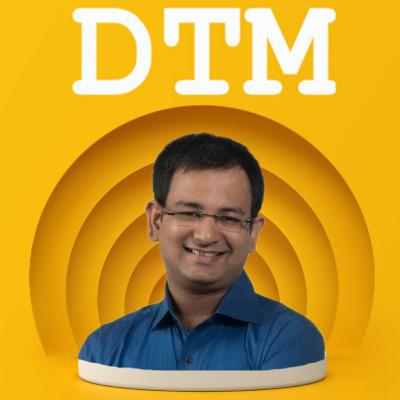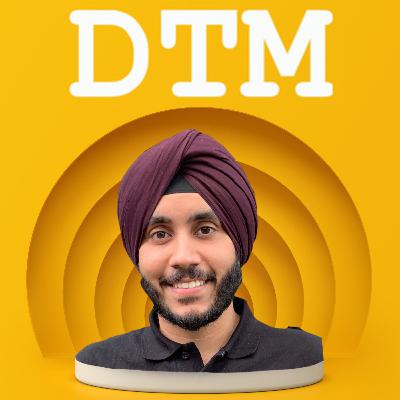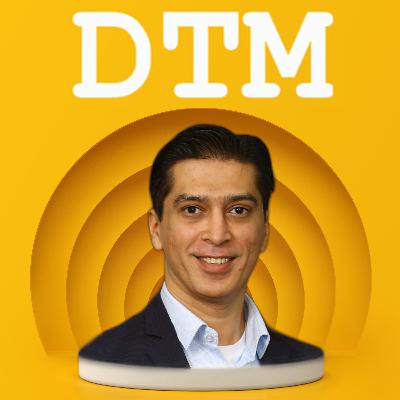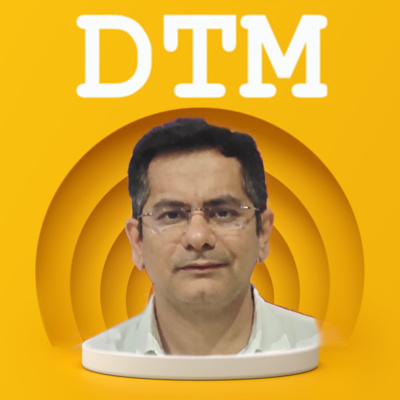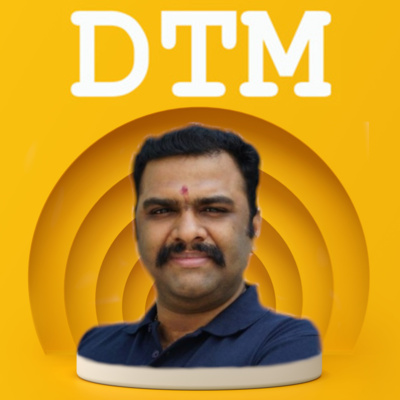Discover Deep Tech Musings
Deep Tech Musings

Deep Tech Musings
Author: PRONOjit Saha
Subscribed: 2Played: 5Subscribe
Share
© PRONOjit Saha
Description
Get actionable and tactical insights to take your Deep Tech startup from Idea to Traction (0 to 1).
For detailed episode insights like summaries, quotes, etc head over to substack - pronojits.substack.com
Deep Tech Musings is a podcast where we talk to exciting startup founders, professionals, and investors in the Deep Tech space (AI, Robotics, IoT, Blockchain, etc). Consider it a platform where one can discover new deep tech use cases and learn novel ways such technologies are being used to solve real-world problems, creating value.
For detailed episode insights like summaries, quotes, etc head over to substack - pronojits.substack.com
Deep Tech Musings is a podcast where we talk to exciting startup founders, professionals, and investors in the Deep Tech space (AI, Robotics, IoT, Blockchain, etc). Consider it a platform where one can discover new deep tech use cases and learn novel ways such technologies are being used to solve real-world problems, creating value.
58 Episodes
Reverse
Arjun is the Founding Partner at Speciale Invest, a seed venture capital fund focused on deep science & tech startups in India, the USA, and Israel. He is passionate about working with exceptional entrepreneurs building emerging tech start-ups in the super early stage. His core expertise has been in product development/management, marketing strategy, org building, fundraising, and finance for over a decade.
Prior to Speciale Invest, he spent over 15 years in the technology and Internet start-up ecosystem in India. He started his career with Yahoo! and later joined Ibibo as Product Manager. The entrepreneurial bug led him to start an Edutech startup and also a travel tech startup, Travelyaari. He has led tech and product teams, and strategy and fundraising at all phases of a start-up lifecycle. At Travelyaari, he built the company to achieve revenues of $40mn and raised $12mn in seed, Series A, and Series B funding.
On today’s episode, we discuss
The Founding Story of Speciale Invest & Why It's One of the Best Places for Deep Tech Startups
Understanding VC Firm Structure
Skills and Abilities to Transition into a VC Role
The Role of Networking & Mentorship in Advancing Your Career in VC
Future Trends in the VC Industry and the Deep Tech Startup Ecosystem
For topic-wise episode summary & more, click here - bit.ly/dtm-as
Links & References:
Arjun Rao- arjunrao (LinkedIn), @raodyboy(Twitter)
Speciale Invest - specialeinvest.com, LinkedIn, Twitter
Eric Newcomers Substack on VC World - www.newcomer.co
Ho Nam, Managing Director of Altos Ventures - Twitter, LinkedIn
Pronojit Saha, DTM Podcast - pronojitsaha (LinkedIn), @pronojits (Twitter)
Show Notes:
(0:26) Overview of Speciale Invest: Motivation and Investment Thesis
(4:26) Speciale's Impact on Portfolio Startups: A Showcase of Growth and Credibility
(8:35) Transition from a Product Person to a VC: Factors and Inspiration
(17:03) Understanding the Structure of a VC Firm
(20:46) Roles and Responsibilities within the VC Team
(24:03) Key Skills from Product Background Useful in Role as a VC
(27:18) The skill of decision-making in ambiguous situations
(30:41) Acquiring and Developing New Skills During Role Transition
(34:15) Developing Context Switching Skills: Training or Experience?
(36:05) Are Financial Analysis and Valuation Skills Essential for Effective Planning?
(37:23) Mentors and Role Models During a Transition: Reflection and Thoughts
(39:43) Questioning the Existence of a "Right Mentor": Active & Passive Mentoring
(42:58) Transitioning from Product to VC: Recommended Resources and Advice
(44:39) Future Trends in the VC Industry for Individuals Looking to Transition
(48:08) The Future of Indian Deep Tech: Predictions and Projections
Dr. Geetha Manjunath is the Founder, CEO, and CTO of NIRAMAI Health Analytix, and has led the company to develop a breakthrough AI solution for detecting early-stage breast cancer in a non-invasive radiation-free manner. Geetha holds a Ph.D. from IISc and management education from Kellogg’s Chicago. She comes with over 25 years of experience in IT innovation. She has proposed and led multiple AI projects at Xerox Research and Hewlett Packard India. Geetha has received many international and national recognition for her innovations and entrepreneurial work, including CSI Gold Medal, BIRAC WinER Award 2018, and is also on the Forbes List of Top 20 Self-Made Women 2020. She was declared the winner of Women Health Innovation Showcase Asia, Accenture Vahini Innovator of the Year Award from Economic Times, and Women Entrepreneur of the Year 2020 by BioSpectrum India. Geetha is also an inventor of 20 US patents and more pending grants.
On today’s episode, we discuss,
Unveiling the Genesis of Niramai: A Pioneering Journey
Getting Early Adopters and Gauging Business Model Viability
Mastering the Art of AI Product Development and Fostering Clinician Trust
Navigating the Financial Challenges of Launching an AI Startup
Going Beyond Borders: Internationalizing Your Startup
The Horizon of AI in Healthcare: A Glimpse into the Future
For topic-wise episode summary & more, click here - bit.ly/dtm-gn
Links & References:
Dr. Geetha Manjunath - geetha-manjunath (LinkedIn), @geethamhp (Twitter)
Niramai Health Analytix - niramai.com, LinkedIn, Twitter
Pronojit Saha, DTM Podcast - pronojitsaha (LinkedIn), @pronojits (Twitter)
Manish Singhal is a technologist-turned-entrepreneur-turned-venture capitalist who aspires to help place India on the global DeepTech innovation map through his work at pi Ventures. With over 31 years of experience spanning diverse fields, including the development of cutting-edge technology products on a global scale, mentoring startups, investing in them, and establishing a deep tech venture fund, he brings a wealth of expertise to the table.
Manish has played a pivotal role in advancing technology in India. He contributed significantly to the development of GPS systems for the Indian Army. Furthermore, he made substantial contributions to the MPEG 4 standard, authoring a chapter that played a crucial role in its commercialization, revolutionizing digital media and communication technologies.
Actively engaged in India's startup ecosystem for the past several years, Manish founded pi Ventures in early 2016 with the vision of accelerating the growth of AI startups in India. Prior to that, he co-founded LetsVenture.com, rapidly transforming it into the premier marketplace for startups and early-stage investors in India. Preceding his involvement with LetsVenture, he served as the India country manager for Sling Media Inc, a Silicon Valley-based consumer electronics startup. During his tenure, he spearheaded the establishment of the R&D and product team in India from the ground up, ultimately achieving a successful acquisition.
On today’s episode we discuss,
The founding story of pi Ventures & its investment thesis
How pi Ventures helps Deep Tech Startups grow
Key criteria for investing in Deep Tech startups
pi Ventures seminal Deep Tech themes report - Deep Tech Shift 2026
The experience of raising an INR 702 cr fund for Deep tech, remotely during the pandemic
For episode summary & more, click here - bit.ly/dtm-mp
Links & References:
Manish Singhal - smanishsinghal (LinkedIn), @manish_saarthi (Twitter)
pi Ventures - piventures.in, LinkedIn, Twitter
Deep Tech Shift 2026 Report - Link
pi Ventures DeepTech: Emerging Frontiers Mini Blogs - Link
Pronojit Saha, DTM Podcast - pronojitsaha (LinkedIn), @pronojits (Twitter)
Show Notes:
(00:31) Founding story of Pi Ventures. What was its motivation?
(4:05) Investment Thesis and Focus Areas
(5:29) Pi Ventures: A Catalyst for Growth in Deep Tech Startups
(9:18) Key Criteria for Investing in Deep Tech Startups
(11:09) Positioning of Indian Startups in Solving Global Problems
(14:35) The Visibility of Deep Tech Startups and Media Attention in the Local Indian Perspective
(16:22) Experience of Raising the INR 700cr Second Fund for Deep Tech Startups
(19:22) Motivation behind the Deep Tech Shifts 2026 Report
(20:45) Exploring the Themes and New Thesis in the Deep Tech Industry
(25:59) The Future of Generative AI: Exploring Its Potential and Layers of Development
(29:21) "Considerations for Taking a Deep Tech Startup to Success"
(31:05) How can deep tech startups position themselves and acquire their first ten customers?
Rob stands at the intersection of AI innovation and business strategy. He is the insightful author of the 'Investing in AI' newsletter, providing invaluable perspectives to investors and tech enthusiasts alike. He previously co-founded Backupify, then Talla, then was a General Partner at PJC. Rob has an intricate understanding of the startup ecosystem and the role of AI in shaping the future of industries. Currently steering the ship as the CEO of BrandGuard.ai, an AI tool to protect & boost your brand, and also a Partner at the AI Operator's Fund, which makes pre-seed investments in AI startups. He continues to be a driving force in AI's integration into the business world. He is an angel in 100+ early-stage companies, mostly AI companies. On the show we discuss,
How Rob Comes Up With Amazing Content for 20 Years
Synthetic Users and Why Real User Feedback Matters Less in an AI World
Why Horizontal Will LLMs Will Loose
The New Age Customer Acquisition Channels and Achieving “Agent-Market Fit”
Why AI Will Kill Most Forms of Long-Term Competitive Advantage
For episode summary & more, click here - bit.ly/dtm-rb
Links:
Rob May - robmay (LinkedIn), @robmay (Twitter), rob@aiinnovators.com (Email)
BrandGuard.ai - Website
Investing in AI Newsletter - Substack
AI Innovator’s Podcast - Apple, Spotify
Pronojit Saha, DTM Podcast - pronojitsaha (LinkedIn), @pronojits (Twitter)
Show Notes:
(0:53) How does Rob come up with great quality content every week, year after year?
(2:03) The Inefficiencies in the Current AI Development Process: User Feedback
(7:14) The Role of Product Development in a World of AI
(12:08) The implications of horizontal LLMs losing in the AI industry.
(16:54) The Role of Agents as New Customer Acquisition Channel: Achieving “Agent-Market Fit”
(24:01) The Impact of AI on Long-Term Competitive Advantage
(28:15) The True Competitive Advantage in an AI First World: Customer Relationships and Brand
(30:50) Using BrandGuard.ai to Protect the Identity of Brands
(34:33) AI Innovators Community
(38:02) Crypto: What Gives?
Avnish is an innovator, strategist, and technology evangelist with 30 years of extensive experience and track record around market making, growth hacking, corporate innovation, digital transformation, and leadership development for Top 500 Fortune clients in both mature and emerging markets. In his current role as MD of Accenture Ventures, he is responsible for leading open innovation programs, building a deal pipeline for investments and acquisitions, academia partnerships, and originating deals in selected segments and accounts.
For the episode transcript and topic-wise summary click here - bit.ly/dtm-aa
On the show we discuss,
(0:56) Jumping Career S-Curves: From Armed Forces to Corporate World
(4:16) Accenture Ventures: Motivation and Role in the Indian Startup Ecosystem
(5:50) Building a Zero-to-One Initiative: Not Just for Startups
(6:35) Defining Deep Tech and Highlighting Portfolio Deep Tech Startups
(9:48) The Role of Accenture Ventures in the Growth of Startups
(13:18) Forming Effective Partnerships with Large Corporations: How can Deep Tech Startups Collaborate with Corporations?
(17:54) Accelerating Startup Growth: Strategies for Deep Tech Startups
(25:25) Key Criteria for Evaluating Startups for Partnerships or Investments: 2-inch wide and 20-inch deep
(27:44) Approaches to Foster a Culture of Innovation in Startups
(31:23) The Importance of Learning from Failures in Startups
(33:05) Accenture Venture's Perspective on Generative AI
(34:49) Initiatives by Accenture in Generative AI
Links:
Avnish Sabharwal- avnishsabharwal (LinkedIn)
Accenture Ventures - Website
Pronojit Saha, DTM Podcast - pronojitsaha (LinkedIn), @pronojits (Twitter)
Sonal is currently VP at 3one4 Capital, an early-stage VC which counts in its portfolio the likes of Licious, Jupiter, Darwinbox, and more! 3one4’s exponential growth has been driven by partnering with generational companies to transform market segments across the country. Sonal has built systems and processes at 3one4 Capital to achieve strong coverage without compromising founder or referrer experience, all while maintaining a lean investments team. In addition to managing routine investment workflows, Sonal looks at fintech, enterprise software, and deep-tech focus areas for the firm. He has been an integral part of the firm’s investments in several category-defining companies.
For episode transcript, topic-wise summary, and more – bit.ly/dtm-s3
On the episode we discuss,
(2:15) Investment Thesis at 3one4 Capital
(4:05) Investment Focus and Startup Stage
(5:05) Defining Deep Tech at 3one4 Capital
(6:26) Deep Tech Startups in 3one4 Capital’s Portfolio
(9:48) Role of 3one4 Capital in the Growth of Unique Startups
(10:58) Key Considerations for Investing in Startups by Phases
(14:22) Five Key Questions That An Investor Is Looking To Answer While Investing
(16:19) Assessing the Right Team: How to Identify Potential Flags and Metrics
(17:52) The Key Components of an Ideal Startup Pitch
(19:28) Determining the Amount of Funding Startups Should Raise
(21:38) 3one4 Capital's viewpoint and approach to Generative AI
(26:08) The Importance of Problem-Solving and Faster Iteration in Product Development
(28:19) The Value Unlocking Potential of GenAI Lies in the End Applications
Links:
Sonal Saldhana - sonalsaldanha (LinkedIn), @sonalsaldanha (Twitter)
3one4 Capital - Website
Pronojit Saha, DTM Podcast - pronojitsaha (LinkedIn), @pronojits (Twitter)
Ankit is the founder of ZedBee Technologies, an IIT-Madras incubated startup that has developed next-generation solutions for energy management in buildings & industries. Their state-of-the-art systems are built around the Internet of Things technology and advanced machine learning algorithms hosted in the cloud.
For more details and an episode summary click here - bit.ly/dtm-az
In the episode we discuss,
(0:28) Ankit’s personal journey into entrepreneurship
(6:53) "The Impact of Professor Ashok (Founder IITM, Research Park) on Indian Entrepreneurs: How Has He Inspired and Motivated Them?"
(15:15) Understanding the End User and Market Scope
(15:46) Potential savings for commercial setup: Past experiences and numbers.
(18:52) Raising a Successful Pre Seed Round: Strategies and Tips
(21:13) Identifying Early Customers for Idea Validation
(22:36) Assessing Technical Feasibility in the Early Stages of Product Development
(24:48) Assessment and Confidence in Developing Solutions: Overcoming Challenges
(26:04) Main technologies in the product
(27:29) Focus on Patents
(27:51) Building Moats in Startups
(31:14) Overcoming Initial Activation Hurdles to Gain Client Trust and Adoption
(35:13) Future Market Forces in the Industry: Technology, Consumer Behavior, and Regulations
(38:39) Advice for Entrepreneurs: Taking an IoT AIML Startup from Zero to One
Links:
Ankit Poddar - ankit-poddar (LinkedIn), zedbee.in
Pronojit Saha, DTM Podcast - pronojitsaha (LinkedIn), @pronojits (Twitter)
We've reached our 50th episode of the podcast! Thanks to all the listeners, the guests & the thriving Indian deep-tech community for their continuous love & support.
Today's episode is a very special one, not only because its our 50th but more so because of our guest. Arpit is a passionate advocate for deep tech transforming our world. With a strong background in startups and technology commercialization, he leads Deep Tech investments at Blume Ventures for a decade now with particular focus on ClimateTech, Electric Mobility, HealthTech, and Logistics. Companies he manages include Spinny, Cashify, Euler Motors, Battery Smart, BeatO and THB. He has been actively involved with promotion of startups since 2006 with prior engagements across Headstart Network and TLabs.
In this episode, explore the Indian deep tech ecosystem with Arpit as he delves into its history, the challenges faced by entrepreneurs, survival in the industry, government’s role, shifting investor trends, and Blume's focus on deep tech.
For episode transcript, topic-wise summary, and more – bit.ly/dtm-ab
Links:
Arpit Agarwal – Arpit Agarwal (LinkedIn), @arpiit (Twitter)
Blume - Blume (LinkedIn)
Blume EV Primer
Blume Indus Valley Report
Pronojit Saha, DTM Podcast - pronojitsaha (LinkedIn), @pronojits (Twitter)
Show Notes:
(0:47) Arpit’s Professional Journey
(3:32) Overview of Indian Deep Tech Ecosystem Evolution and Key Milestone Turning Points
(10:46) Challenges and Opportunities in Indian Deep Tech: Funding, Skilled Talent, and Market Acceptance
(16:14) The Connection Between Risk-Taking and Success in Deep Tech
(17:47) Market Acceptance for Deep Tech Solutions & its Evolution
(20:50) The Impact of Government Initiatives on Deep Tech Startups
(23:17) The Role of Academic Institutions and Research Centers in Industry-Academia Partnership
(25:06) Trends in Investor Interest and Funding Availability for Deep Tech Startups
(29:22) Advise to Deep Tech Founders
(31:17) Technologies with Significant Potential for Future Growth
(32:39) BLume's Portfolio Startups: A Brief Overview
(33:38) Why is Blume considered one of the best places for deep-tech startups?
(35:36) What needs to be done to have successful deep tech startups like OpenAI from India?
In this episode, we have an exciting guest, Nihal, the co-founder of Myoworks, a biotech startup that is shaping the future of the cultivated meat industry. Nihal shares the founding story of Myoworks and how they adapted 3D printing to create something more innovative and cutting-edge for the cultivated meat industry. He talks about the team's journey in creating a novel scaffolding technology for the industry. We also touch upon the benefits of cultivated meat as a sustainable and eco-friendly alternative to conventional farm meat. Lastly, Nihal mentions the team's success in securing funding through BIRAC and the SINE incubator at IIT Bombay. So, let's dive in and learn how Myoworks is revolutionizing the food industry!
For episode transcript, bullet point summary, and more – bit.ly/dtm-nm
Social Links
Nihal - nihal-singh (LinkedIn)
MyoWorks - www.myoworks.in
Pronojit Saha, DTM Podcast - pronojitsaha (LinkedIn), @pronojits (Twitter)
Show Notes
(0:29) Founding Story and Overview of Myowworks
(2:11) Understanding Cultivated Meat: Ingredients and Appearance
(5:22) Benefits of cultivated meats
(7:47) Regulations Around Cultivated Meat
(8:14) The Challenges of Raising Funding for BioTech Startup
(11:08) Assessing Business Model Viability in Early Stages
(13:07) Identifying Early Customers for Startup Success
(15:32) Working with design partners
(16:25) Assessing Technical Feasibility and Iterative Process
(19:40) Facilities for Technologies: In-House or Ecosystem Enabler?
(21:27) Overcoming hurdles in Biotech startup marketing by being Data Driven
(24:50) Current Status and Future Expectations of Market Regulations in Singapore and Worldwide
(26:28) Challenges in scaling for the BioTech industry
(28:30) Insights on Raising Seed Funding for Biotech Startups
(31:20) Anticipated BioTech market forces in the next 3-5 years
(32:22) Advice to fellow BioTech startup founders to gear them for success.
Neeraj is an industry veteran with more than two decades of experience in leading Strategy, GTM, and Operations globally for Fortune 500 companies. In this episode, he shares his journey from working in leading corporates to becoming an angel investor in startups and eventually founding Xscale. He talks about his motivation for creating the company, which is aimed at helping startups scale their businesses and overcome the common struggles of scaling, selling, and monetization. Neeraj shares his insights on deep tech and highlights some of Xscale's contributions to helping startups go from zero to one. Neeraj also provides his top five pieces of advice for entrepreneurs looking to take their deep tech startups from zero to one. The episode concludes with a discussion on the importance of GTM strategy for deep tech startups and how to use a template-based approach for startup GTM motions.
For episode transcript, bullet point summary, and more – bit.ly/dtm-xscale
In this episode we discuss,
(00:27) Founding story of Xscale and its motivation
(03:24) What is the current team composition of Xscale?
(05:05) How does Neeraj define Deep Tech?
(06:32) Xscale’s contributions in helping startups go from zero to one
(13:03) Neeraj’s top 5 advice to entrepreneurs who want to take their deep tech startups from zero to one
(21:30) Can GTM motion be the moat for deep tech products?
(25:18) How does Template based approach of GTM change the scenario?
(31:25) Future initiatives of Xscale in deep tech space
Social Links:
Neeraj Randev – neerajsaxena (LinkedIn)
XScale - xscaleglobal (LinkedIn)
Pronojit Saha, DTM Podcast - pronojitsaha (LinkedIn), @pronojits (Twitter)
Shashank is the Co-Founder of 100X.VC - India's first venture fund to invest in early-stage startups using iSAFE Notes. He brings entrepreneurial and investment understanding with 15+ years of cross-functional expertise. Shashank’s professional ability in developing, launching, and making the first move when it comes to products and solutions is reflected in the novel model of 100X.VC. As a Co-Founder of 100X.VC, he is part of the Investment Committee and works closely with portfolio companies on how to improve the chances of new products succeeding. He also helps them raise follow-up capital from growth-stage VCs, CVCs, and family offices. Apply for the Class 10 cohort for INR 1.25 CR funding here: www.100x.vc/class10
In this episode we discuss,
(00:31) Founding story of 100X.VC. What was its motivation?
(02:30) What is iSAFE Notes and how startups can take advantage of it?
(06:01) How can startups apply to 100X.VC and what's their program structure like?
(09:55) How does 100X.VC define deep tech?
(11:31) Some portfolio deep tech startups of 100X - Accio Robotics, Confider Health, Emo Energy, Meta Shop, Think Metal
(15:10) Shahank’s 5-stage deep tech startup lifecycle framework & how 100X helps deep tech startups to move through the stages
(19:50) Shashank’s advice to deep tech founders to take their startup from 0 to 1
(23:21) What does 100X look for in deep tech startups while deciding to invest?
(27:44) What are some future initiatives being planned at 100X?
(29:41) What are some future opportunities in deep tech domain that Shashank wished a startup could capitalize now?
Social Links:
Shashank Randev, 100X.VC - shashankrandev (LinkedIn), @ShashankRandev (Twitter)
Pronojit Saha, DTM Podcast - pronojitsaha (LinkedIn), @pronojits (Twitter)
Links & References from the episode:
- Emerging Deeptech Article - https://www.100x.vc/blog/emerging-indian-deep-tech-ecosystem
- Generative Ai trends Article: https://www.100x.vc/blog/generative-ai-8-futuristic-trends
- 100X Investment Thesis - https://www.100x.vc/investment-thesis
- 100X.VC portfolio: www.100x.vc/portfolio
Dr. Ritu Verma is the Co-founder and Managing Partner at Ankur Capital – an early-stage venture capital firm that invests in digital & deep science technology startups. Prior to starting Ankur Capital, Ritu ran Truven, an advisory firm for venture funds looking at investments in India and SE Asia. She is passionate about bringing innovation from the lab to the market and did that for over a decade across different roles at Philips and Unilever across the globe.
In this episode, Ritu shares her insights into the world of deep science technologies, including synthetic biology, battery chemistry, bioinformatics, and materials. She also discusses Ankur Capital's investment philosophy and how they support deep science entrepreneurs in India. Ritu highlights the importance of user research and the need to bring in business, market, and customer skills to test whether an innovation is a solution to a customer's problem. Whether you are an aspiring entrepreneur, or an investor interested in deep science startups, this podcast is a must-listen. Tune in to gain valuable insights into the world of deep science technologies and how early-stage startups can set themselves up for success.
Find the episode summary, transcript & more here - bit.ly/dtm-ritu
Show Notes:
(00:46) What motivated founding Ankur Capital's deep science technologies vertical?
(02:32) How does Ritu Verma define deep science?
(05:30) Portfolio startups that Ankur Capital has invested in, the problems they solve & their IPs
(09:30) What makes Ankur Capital one of the best places for deep science startups?
(11:15) Ritu’s top 3 advice to entrepreneurs looking to take their deep science startup from zero to one.
(14:15) How can deep science startups de-risk their long gestation periods?
(16:50) How can startup founders assess scalability potential early on?
(19:50) Ritu’s viewpoint on the prevalence and importance of doing user research in the deep tech industry.
(24:05) How to build moats in deep science products? What is ring-fencing?
(26:55) Future initiatives of Ankur Capital in deep science space.
(27:55) Future opportunities in deep science space that startups should capitalize on
— Where to find Dr. Ritu Verma:
· LinkedIn – ritu-verma
· Twitter – @rituverma01
— Where to find Ankur Capital:
· LinkedIn – ankur-capital
· Twitter – @ankurcapital
· Web – Ankur Capital
—Where to find Pronojit Saha, DTM Podcast:
· LinkedIn – pronojitsaha
· Twitter – @pronojits
Are you ready to be inspired and gain valuable insights from one of the most successful and accomplished evangelists in the Indian startup ecosystem? On this episode of our show, we have the privilege of sitting down with Ravi, a true trailblazer who has overcome incredible obstacles to achieve success in his career. From growing up in a Naxalite-affected area in India to holding key roles at Venture Catalyst, Shark Tank, and the private office of the Royal Family of Dubai, Ravi has a wealth of experience to share around those roles.
You'll also hear about his 2-month-long international startup tour spanning 11 countries, and the insider tips he has to offer on the best things to eat in those countries! But that's not all, Ravi also shares his expert advice for entrepreneurs looking to raise funds and what to look for in investors. With over 2000 startup events under his belt, he's also got big plans for a first-of-its-kind Startup Angel event later this year in Abu Dhabi and he's going to give us a sneak peek into what we can expect. Don't miss this opportunity to learn from one of the most accomplished and successful evangelists in the Indian startup ecosystem. Tune in now!
Find the chat transcript and summary at - https://pronojits.substack.com/p/dtm-e45-ravi-ranjan-entrepreneurship
Social Links:
Ravi Ranjan, Entrepreneurship Evangelist - itsraviranjan (LinkedIn), itsraviranjan (Twitter)
Pronojit Saha, DTM Podcast - pronojitsaha (LinkedIn), @pronojits (Twitter)
Show Notes:
(00:02:16) What motivated Ravi towards entrepreneurship early on in his career
(00:05:30) Ravi’s viewpoint on enabling entrepreneurship at the grass-root levels
(00:10:20) What has led to Venture Catalyst’s phenomenal growth in angel investment space
(00:14:00) Ravi’s experience in designing the biggest startup show in India - SharkTank
(00:18:40) The goal of the Private Office of the Royal Family of Dubai for startup development
(00:21:55) Middle East rising up to capitalize on the Web 3.0 startup ecosystem
(00:23:20) Ravi’s experience on representing India across 11 startup nations in 2 months
(00:28:40) Ravi’s gastronomical insights on European food!
(00:31:50) Ravi’s advice to entrepreneurs on things to consider while raising funding and things to look out for in investors
(00:34:30) Ravi’s big plans for one of world’s first and largest event for angel investors in Abu Dhabi
Padma Shree Ashok Jhunjhunwala is the founder and president of IIT Madras (IITM) Research Park & Incubation Cell (IC), one of India’s foremost Deep Tech startup hubs. As of recording, IITM IC has incubated 280+ startups generating Rs 1620+cr revenue at a valuation of Rs 33000cr (US 4.1B), and it’s ever-growing. Some of its marquee startups are Ather, Uniphore, Stellapps, MediBuddy, and many more. Prof Ashok is a strong proponent of entrepreneurship and has motivated & guided 1000s of students & young entrepreneurs over the years towards the same. He was also the former principal advisor to the Ministry of Power, Govt. of India.
In this episode, Dr. Ashok takes us back to the India of the 90s to highlight how some trends that motivated him toward the entrepreneurial ecosystem. He talks about inspiring other entrepreneurs not just to believe but also to act on the power of ideas by building things. He highlights the DNA of IITM IC and how it’s a startup in its own right. He opines on the future of the deep tech industry and shares his advice for entrepreneurs just starting out. With his wealth of experience comes a treasure trove of insights. Surely not to be missed.
In this episode we discuss:
(00:01:39) How has India's entrepreneurship and startup scene changed from the 1980s and 1990s to the present day?
(00:12:43) How does Dr. Ashok define deep tech?
(00:14:30) What makes IITM Incubation Cell an ideal place for a deep tech startup?
(00:20:33) How does Incubation Cell help someone grow once they are accepted into the system?
(00:23:28) Some marquee startups to come out of IITM IC
(00:25:10) Opinions on some of the initiatives that the ITM Incubation Cell is planning for the future.
(00:26:40) What does Dr. Ashok think about the general prospects of the deep tech industry?
(00:27:05) What are some of the future trends he sees?
(00:29:27) Dr. Ashok's top three pieces of advice for aspiring entrepreneurs just starting out
— Where to find us:
Dr. Ashok, Founder President IITM RP & IC - Wikipedia
Reema Saha, Head of Sales & Marketing, IITM RP & IC - LinkedIn
Pronojit Saha, DTM Podcast - pronojitsaha (LinkedIn), @pronojits (Twitter)
— Where to find IITM Incubation Cell & Research Park:
LinkedIn – IITM-Incubation Cell, IITM Research Park
Facebook – IITMadras Incubation, IITMadras Research Park
Twitter @iitm_respark
Web – incubation.iitm.ac.in, respark.iitm.ac.in
Jitesh, is the founder and CTO of Ishitva Robotic Systems, which is building futuristic automated Material Recovery Facilities (MRF) that can sort different types of waste at high volume for Indian Cities. Automated MRF solutions incorporate AI Vision Systems, Mechanical Robots, High-Speed Sorting, and Live Analytics of Waste Streams which Jitesh has developed at Ishitva over the last 6 years. Their clients include Municipal Solid Waste Companies, Plastic Aggregators, and different types of companies who recycle and create pellets, paper, cardboard, etc. Ishitva's vision is to provide automation sorting solutions for all types of waste like Plastic, Paper, Cardboard, Glass, Metal, Rubber, etc. Before Ishitva, Jitesh had 12+ years of experience in the software industry and worked for Fortune 500 Companies building products and solutions across the globe.
In today’s episode, we talk about how Ishitva can act as a catalyst for the “waste circular economy” by providing a high volume of materials to recyclers. Jitesh highlights how to evaluate the technical viability of AI/ML solutions and how to make clients trust AI. He further ruminates about the prospects of making his vision system available as a service. We end up with Jitesh’s advice on making it from idea to traction in deep tech and how the technology space in Gujarat is moving ahead in Automation R&D.
In this episode, we cover
(00:01:02) What inspired Jitesh to get into entrepreneurship?
(00:05:20) What is the problem Ishitva solving? What is the circular economy?
(00:08:24) Ishitva’s traction till now and major clients
(00:10:05) Ishitva’s hardware and software technology stack
(00:15:02) How to assess the technical viability of an AI/ML solution early on?
(00:20:43) How to make consumers or clients accept and trust an AI product?
(00:23:09) How can deep tech startups create competitive moats?
(00:28:44) Like large language models, can Ishitva’s vision system be offered as a service as well?
(00:31:00) What are Jitesh's top suggestions for launching a deep-tech startup or product?
(00:33:48) Jitesh's viewpoint on the developments taking place in Gujarat in technology domain
Where to find us?
Jitesh Dadlani – jiteshdadlani (LinkedIn)
Ishitva Robotic Systems – Ishitvaroboticsystems (LinkedIn), @IshitvaSystems (Twitter), ishitva.in (Web)
Pronojit, DTM Podcast - pronojitsaha (LinkedIn), @pronojits (Twitter)
Swapnil Jain has a vast experience of 17+ years and is a proficient all-rounder when it comes to Product Evangelism, Project Management, Seed Investments, Mentorship, Entrepreneurship, Leadership, Speaker, and Tech-Evangelism. He is currently a founder and CEO at ORAI Robotics, an AI-Powered Robotic Virtual Assistant for Education, Automobile, Healthcare and other industries. It serves as a "Performance Amplifier" for generating and qualifying quality leads and delivering higher strike rates to customers automatically 24x7.
With his rich niche experience in transforming business ideas into technology-driven business models, his entire focus is on evangelizing Digital Transformation with the power of AI/ML and RPA. In the era of Artificial Intelligence and Voice-First trends, his true experience lies in formulating digital business strategies that are matched with technological implementation to collaborate and compete in a new market.
In this episode, we cover
(00:00:29) Swapnil’s super interesting back-story and what motivated him towards entrepreneurship.
(00:09:42) What are the major products of ORAI?
(00:13:40) Is conversational AI a crowded space? Should that be a barrier for new entrants?
(00:16:26) Did ORAI take a horizontal or vertical product approach and why?
(00:18:19) What were the initial activation hurdles that ORAI faced to make clients trust and try their product?
(00:19:51) What are the major technologies at play in the product?
(00:21:58) What are the competitive moats for ORAI?
(00:26:20) Swapnil’s thoughts on human-like interaction of AI conversation agents
(00:31:09) Swapnil’s advice to fellow entrepreneurs to make their journey from zero to one
(00:36:15) What have been some unexpected uses of their product?
Where to find us
Swapnil Jain – swapniljain (LinkedIn), swapnil_jain_25 (Twitter)
ORAI – orairobotics (LinkedIn), ORAIRobotics (Twitter)
Pronojit, DTM Podcast - pronojitsaha (LinkedIn), @pronojits (Twitter)
Nishanth Raja, is a researcher turned entrepreneur with expertise in Ultrasonic Guided wave, Hi-Temp Sensor, NDE, Data analysis and interpretation. He is the co-founder of XYMA Analytics, a Deep tech startup on a mission to enhance industrial automation using IoT-enabled Ultrasonic Waveguide sensors to address the critical pain point in industries with High-Temperature applications.
In this episode, we cover
(00:00:39) Backdrop on Xyma’s Aegis Graham Bell innovation award
(00:02:08) What motivated Nishanth to start Xyma Analytics?
(00:05:30) What is the core problem that Xyma is looking to solve? And what are the products that it has come up with to solve that problem?
(00:09:57) What were some of the initial activation hurdles Nishanth faced to make his clients trust and try his product?
(00:10:21) How did Nishanth overcome those hurdles?
(00:11:59) What are the major technologies at play, and what software layer is on top of it?
(00:15:47) After gaining some good traction, how has Nishanth’s team gone about building moats into this product?
(00:16:53) What advice does Nishanth give to fellow entrepreneurs who are looking to make it zero to one in this field?
(00:19:06) How did Xyma go about defining its customer segment in the initial days? And how did it change over the years?
(00:21:16) What are some of the biggest challenges right now for Xyma?
(00:23:20) How does Nishanth see the role of AI contributing towards the growth of Xyma?
Where to find us?
Nishanth Raja – nishanthraja (LinkedIn)
XYMA Analytics – XYMAAnalytics (LinkedIn), @AnalyticsXyma (Twitter)
Pronojit, DTM Podcast - pronojitsaha (LinkedIn), @pronojits (Twitter)
Divanshu is the co-founder of Solinas, which is a deep-tech IITM incubated start-up that develops robotic & AI solutions for the pipeline and sanitation industry, solving problems of water leakages and eliminating manual scavenging. Their products organize the management of pipelines and tanks by providing efficient solutions and data-driven decision-making for their customers. Solinas has won multiple awards in its journey till now.
Divanshu is a recent mechanical engineering graduate from IITM and a young entrepreneur who is passionate about solving complex problems using first-principle thinking. He firmly believes in the power of technology and is constantly looking to amplify the impact of social enterprises through that. He was one of the only 2 students to receive both an academic and a nonacademic institute prize while graduating in 2019. He is a regular speaker at events organized by WEF, TFI, IIT Madras, BITS, and others
In this episode, Divanshu shares his story on building his startup and the products that Solinas is building. He gives his thought on the predicament of a robot replacing a human and how he views the situation. He shares how Solinas has structured itself to build products that are more pull than push products. Finally, he shares insights on how Solinas intends to build moats and his advice to entrepreneurs in the same field looking to make it from zero to one.
Divanshu Kumar – divanshukumar (LinkedIn), div_involve (Twitter)
Solinas Integrity Pvt. Ltd. - www.solinas.in/ (Web), solinasintegrity (LinkedIn)
Pronojit, DTM Podcast - pronojitsaha (LinkedIn), @pronojits (Twitter)
Show notes:
(00:00:36) Divanshu’s background and experience in starting the IIT Formula Electric team
(00:02:05) What motivated Divanshu to startup?
(00:04:12) What are the products that Solinas is building?
(00:06:32) A perfect case of a robot replacing a human, does Divanshu see this situation differently?
(00:11:23) How have Solinas structured themself to build products which are more of a pull than push products?
(00:13:30) What are the main technologies at play in Solina’s products?
(00:15:27) How Solinas plans to utilize data and build vision analytics capabilities
(00:17:30) What is the intelligence layer that Solinas plans to build on top of its products?
(00:20:50) How do Solinas intend to build moats into their product?
(00:22:38) What are the biggest challenges that Solinas is facing right now?
(00:25:12) Divanshu’s advice to entrepreneurs looking to make it from zero to one in this field?
Harshit is the founder & CEO of Intugine Technologies, an end-to-end multimodal supply chain visibility platform. Intugine's real-time logistics visibility platform brings together disjoint systems and helps businesses optimize their logistics operation. Some of India’s renowned brands like flipkart, myntra, LG, Diageo, Mahindra, Ford, etc use Intugine's platform to negotiate volatility and uncertainties in their supply chain.
In this episode, Harshit shares his motivation to start Intugine and the discoveries that led his team to successfully pivot from B2C to B2B segment. He shares the various resolutions of location data being enabled by Intugine and reveals how is the product embedded into logistic supply chain. He talks about the 3 layers of location intelligence and how is the predictive layer acceptance on the field. Harshit give his advice to fellow entrepreneurs in logistic industry in making it from zero to one and shares his views on building moats in technology startups.
Harshit Shrivastava - harshitshrivastava (LinkedIn), harshit_iiitkgp (Twitter)
Intugine - www.intugine.com/ (Web), intugine-technologies (LinkedIn), @intugine (Twitter)
Pronojit, DTM Podcast - pronojitsaha (LinkedIn), @pronojits (Twitter)
Show notes
[00:00:17] What was Harishit’s motivation to start Intugine?
[00:02:31] What discoveries led Harshit to successfully pivot from B2C to a B2B segment?
[00:07:16] What is this visibility challenge within the supply chain industry? And how does Intiguine’s product solves this challenge?
[00:11:47] The various resolutions of location data being enabled and the 3 layers of location intelligence
[00:20:05] How well is the acceptance of the predictive layer among organizations?
[00:22:46] How to build moats in technology startups?
[00:25:11] Which among the three layers will be more focus going forward?
[00:26:32] Advice to fellow entrepreneurs who want to make it from zero to one in logistic industry.
Vijay Krishna (VK) is the co-Founder of WEGOT Utility Solutions which aims to reduce the water consumption by bringing about a much need behavioral change in the way people use water. WEGOT’s IoT based Smart Water Meters help manage water consumption and help save up to 50% of water in buildings.
In this episode, VK shares details about WEGOT’s product and features, and the benefit their users can enjoy and consequently how the product has shifted human behavior. He gives his view on how he overcome hurdles and how he build a product in cutthroat IOT technology domain. VK also gives advice to entrepreneurs in the IOT industry and shares his thought on how to build moats in the same.
Vijay Krishna, WEGOT – vijay-krishna (LinkedIn)
WeGot - https://www.wegot.in/ (Web), wegot-utility-solutions (LinkedIn), @WEGoTtech (Twitter)
Pronojit, DTM Podcast - pronojitsaha (LinkedIn), @pronojits (Twitter)
Show Notes
[00:00:29] VK’s background and how he started with his startup WEGOT .
[00:02:37] What does the device do?What are the actions that users can take and the benefits that they can derive?[00:04:33] How user can segment that where user is using? How would user know that where user using more water?
[00:06:54] How does the product shift human behavior?
[00:08:23] How did WEGOT overcome the initial activation/installation hurdles?
[00:12:28] What are the major technologies at play in the product?
[00:14:43] With so much of data being captured, what is VK thoughts on utilizing analytics capabilities?
[00:16:31] How to build a competitive differentiation/moat in technology products?
[00:20:34] What are major challenges for WeGot now and their future vision?
[00:22:41] VK’s advice to aspiring entrepreneurs in the IOT space








